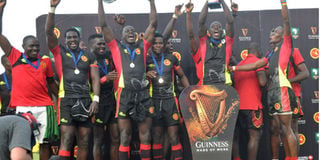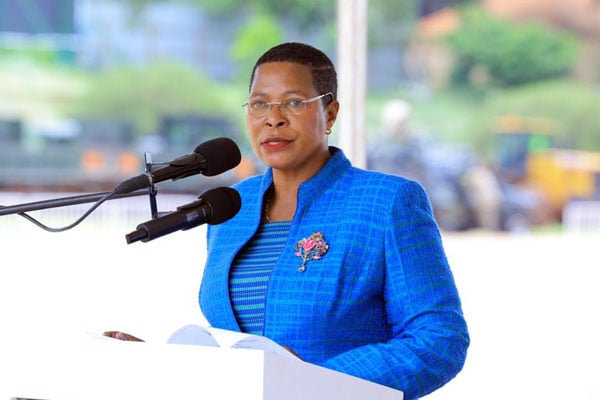Priority funding; why some sports struggle

The national rugby sevens team will represent Uganda at the Commonwealth Games after lifting the Africa Cup
KAMPALA- On October 7, 2017, Uganda beat Zimbabwe 10-7 in the finals of the Africa Cup at Legends, Lugogo as both sides qualified for the 2018 World Rugby Sevens in San Francisco, USA.
The euphoria was evident as this Rugby Cranes side had also secured a place at April’s Commonwealth Games and defended the continental title they first won in 2016.
The mood was, however, dampened when fans learnt that the team had only received Shs3.2m for their preparations ahead of the games. It was not lost on the rugby fraternity that the national soccer team the Cranes had secured Shs1bn from government ahead of their 0-0 home draw with Ghana in Namboole on the same weekend.
For many this was a case of misplaced priorities but as that debate rages on, the Rugby Cranes Sevens are increasingly learning that playing in San Francisco in July will require intense preparations.
According to Uganda Rugby Union (URU) president Andrew Owor, the team needs about Shs249m for preparations if they are to compete rather than just honour their fixtures in San Francisco during the July 20-22 tournament.
Under article 3ii, the National Council of Sports Act of 1964 and in Regulation 15 of the NCS Regulations 2014, the regulator is supposed to fund activities of national sports associations (NAs). Owor and his executive are therefore looking at government to fund the bulk of the budget.
“We have made every effort to get government involved and they are happy with the progress of Ugandan rugby,” says Owor, who also insists they needed these funds as early as November.
Recent trips to Cape Town and Dubai showed why talent alone might not be enough at this stage. In Dubai, Uganda started off with a 19-10 loss to South Africa.
For many it was a marked improvement for Coach Tolbert Onyango’s side against the holders of the Commonwealth Games title because exactly a year ago, the Springbok 7s had thumped Uganda 46-0 at the same Sevens Stadium. Uganda also showed effort in 22-17 and 29-14 losses to Canada and Kenya respectively.
In Cape Town, there was less fight against the top sides as Uganda lost 36-0 to England, 45-0 to Scotland, 43-7 to Argentina in the pools, a sign that there is a lot for Rugby Cranes to do.
“We have met government three times over the budget and they say it is manageable and much less than what football usually takes.
“However they have given us just Shs3.2m which they say was for visa fees to go to Dubai. The purpose was valid and there is hope we shall have more,” Owor says.
While government usually keeps its promises as far as funding national teams is concerned, the money usually comes too late to help the preparation process.
A case in point is when a Ugandan delegation travelled to the Commonwealth Games in Glasgow, Scotland but their money came after they had returned from the 10-day event.
Sports minister Charles Bakkabulindi told President Yoweri Museveni at the flagoff ceremony at State House, Entebbe, that the Glasgow-bound team’s money had earlier been used to charter a plane for the football Cranes’ trip to Morocco for a World Cup qualifier against Senegal in September 2013.
Players cry-out
Rugby, according to two-time African most valuable player Phillip Wokorach, cannot afford this kind of wait because while they have postponed training till February, their opponents are already making every second count.
“As players we have worked hard and sacrificed a lot. In training, we lack basic equipment but have to improvise because of our passion for rugby and Uganda.
“Sometimes, the coach steps in to ensure we have what we need. But he cannot keep using his money, it is not fair on him. He is good and has a great plan for us but we need finances to implement it,” Wokorach shares.
Wokorach who now plays for Kenyan club Kabras Sugars is well travelled too and warns that players’ welfare is as important as the hours they put on pitch.
Usually after training at Kyadondo or Legends, rugby stars disappear into the darkness in search of cheap foods like chapattis and eggs (rolex), porridge, tea and molokony, usually off their meagre daily training allowance (Shs5,000).
Those that might need the Shs5,000 to cater for other needs have to settle for the supplements provided by the Union.
It is because of such abrasive conditions that some players decide to abandon the sport or disappear during trips to eke a better living. In October, coach Onyango lost the services of Brian Kikaawa, Fred Odur and Ramathan Govule who went under the radar in Munich, Germany where Uganda had taken part in the Oktoberfest Sevens.
“The difference between us and the countries ahead of us is that for them, the player is the priority. They cannot make up excuses for not performing on pitch unlike us, who have every reason to be frustrated but soldier on.
“We have pending allowances. Even those from Cape Town, are not cleared. The truth is God is fair so whoever fails to prepare, will have a rough time in San Francisco,” Wokorach cautions.
Rugby, unlike other sports, requires strength and conditioning training which these players had to start this month, rest in February and resume high intensity training in March ahead of the World Series in Hong Kong and Commonwealth Games in April. For now it looks like they will start training belatedly in February.
NCS’s take
With a paltry budget of Shs3.3bn National Council for Sports (NCS) has been forced to prioritize funding towards netball, boxing, athletics, basketball and Paralympics.
“The guiding principle in that was performance. We looked at associations that have put Uganda on the world map over the years,” NCS general secretary Nicholas Muramagi, says.
The netball national team She Cranes went through the same financial troubles during the qualifiers of the 2015 World Cup. But with the backing of the Speaker of Parliament Rebecca Kadaga and other Members of Parliament like Winnie Kiiza, their status continues to improve.




